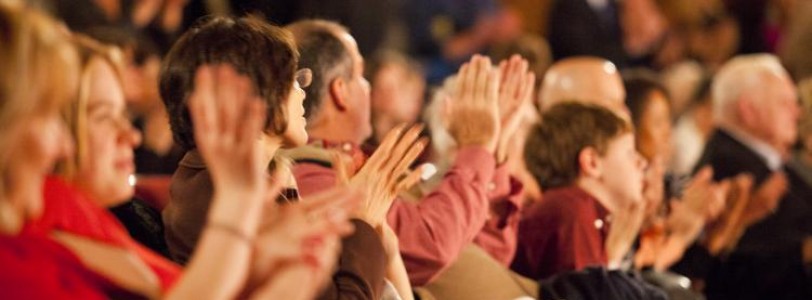There is theatre etiquette for the audience to be able to watch a performance which actors/directors/producers have worked so hard on…so why is it that some audiences don't follow this – is it because of their lack of knowledge, lack of respect or simply because they don't know any better? I've chosen to explore this arts issue as not only has many actors and audience members experienced this, but also because it's a subject which isn't really talked about which I would really love to, and due to having previous experiences with this I feel like I'm really able to talk about this subject. Rude audiences have always been in every performing arts element, most likely ever since the first piece of theatre was every performed – so why has this been happening for such a long time?
A specific reason why I chose this arts issue, is because of two of the experiences I have had within the theatre. On the first experience of watching Macbeth with my class, I noticed that a lot of people were talking over the actors, or constantly leaving the theatre to get drinks (which usually is fine, don't get me wrong – but when you have to make a huge noise about it's a bit inconvenient) People were on their phones on social media (could you not wait until at least the interval or after? I'm sure liking that status can wait) Another experience was watching The Woman in Black at the Marlowe Theatre with the same class, however in my opinion this experience was even worse – as right in front of me there was a person…on Snapchat, literally taking selfies throughout the performance and someone literally answered their phone during the performance, so the question is why do they think this acceptable to do?
However researching this subject, I've actually learnt that there is so many more issues within the audiences than I originally thought, and answering the question isn't going to be as simple as I thought. Originally I presumed that most ill-mannered audiences are in less popular types of theatre such as abstract theatre which requires a lot of attention to detail, possibly because they don't have as much respect for the more independent types of theatre as they do for high-end musicals, possibly because they have to pay a lot more attention which they might not want to do. However a lot of the research I looked at this actually happens everywhere. For example, a quote I found was "The theatre is about a relationship, it's a give and take. I look for a smile, a laugh, anything. If they're actively sitting there with no expression, I stare them down. Back in 'Kinky Boots', I could address them directly. I'm a man in a dress and I'm standing up here working real hard, so the least you could do is smile at me, you know what I mean?!" by Billy Porter, who starred in 'Kinky Boots' in 2013. It's interesting because I've learnt almost the extremity of the audience rudeness to the point where they would not even show gratitude towards actors which work on pieces for months and months, and perform their hearts out and for the audience not to show any sort of respect towards the actors.
Another quote I looked at was "We see you, we hear you, and in some theatres we even smell you — or the doggie bag under your seat." From Michael Cerveris, who performed in 'Fun House' in 2015. It's quite interesting how not only do people eat within the theatre, but people actually hide food to be able to eat in the theatre without paying for it. This has really helped me learn the extent of the types of things audiences can do when watching a performance. "Loud talkers! Even a whisper is too loud when you're in theatre. In the bubble outside my head, I'm always thinking, 'Do you realize I can hear you?!'" by Hugh Jackman, who performed in 'The River' in 2015 and 'The Boy From Oz' in 2013 really stood out to me within the article. The reason why was because I was somewhat aware that there are moments which people talk within a performance, but I had no idea that some audience members talk too loud to the point of actors hearing them, and thinking about it there are most likely a lot of actors who have had this experience and I think this is incredibly disrespectful, not only to the actors but to the audience members who want to watch the piece of theatre in its entirety – whether it's a Shakespeare inspired piece or a children's piece – each performance should have the same amount of respect and should have boundaries. A rule from the article by Brittany Stelluf is being quiet throughout the performance and "keeping the conversation to a minimum and speak quietly" which I definitely agree with, as looking at my survey results I done it is clear that people talk a lot within performances, so if the people who decide to talk in audiences continue to do so, they should at least have the respect for other people within the audience to talk quietly and minimally.
Looking at my evidence, I decided to look at another article to really get an idea of what theatre audiences do and why they are ill-mannered. For example, an article from The Guardian talking about disruptive audience members quotes: "There are plenty of people who seem to think that they haven't actually experienced something unless they have photographed and videoed it – and that extends to their theatregoing. I have seen members of the audience blatantly video the whole of both Dora the Explorer Live! and Jesus Christ Superstar, and ushers have watched them do it, entirely unperturbed. Maybe people are confused. If it's all right in Dora the Explorer, maybe it's OK in the new West End production of Passion Play, too?" written by Lyn Gardner, who is a writer for the Guardian and has watched many types of theatre performances for many years. This has really helped me understand not only about what audience members do yet again, such as recording a performance and going on their phone in general, but also helps me really understand a specific element in the sense that if someone can record or be on their phone for a performance once, they feel like they can go their phone again and again – simply because they don't know any better.
I decided to do a survey asking questions such as "Have you ever eaten in theatre" and "Have you ever talked during a performance" and shared it on social media such as Facebook as well as with my peers and I got some surprising results. 50 people answered this survey however only 30% go on their phones throughout a performance, whilst 70% of the people who responded to the survey don't. This is really interesting as it almost highlights the fact for me not only as an actor, but as an audience member watching a piece of theatre that it's only a small amount of people who even go on their phones and it's not done as much as I originally thought before answering this question. One question response really shocked me when analysing the data, as over 88% eat during a performance whilst only 12% don't. Now this would make sense, due to the amount of food which is available from many theatres, however I actually didn't expect there to be as many people who eat within the theatre. Looking at the question for "Have you ever not clapped for a performance?" I was pleasantly surprised to see that over 84% said No, as this really shows that the majority of an audience or the people who responded to the survey actually have an element of common respect to clap after a performance, however some of the responses for reasons why they haven't clapped for a piece of theatre really surprised me. For example, someone's response on the comment box which I put "If yes, state why" was "Clapping is appreciation – if I didn't enjoy it – didn't show appreciation" This really sparked something in me, in the sense that this might be the justification behind why some people might not clap for a piece of theatre. In my opinion, I think this is absolutely crazy – as even if YOU didn't enjoy it, surely people should just clap because of the hard work the team has put in to produce the performance, as that is the only response some actors get, some actors don't even get paid for the months they learn scripts, devise and perform – so that could be the only appreciation they get for their own practice. The question for "Have you ever talked during a performance" got unsurprising results with a percentage of 72 who has said they have, however the reasons why is much more "reasonable" than I thought. A lot of the responses on the comment boxes were to ask the person next to them about what is happening within the context of the play, or simply commenting on the piece itself. I got the anomaly answers such as audience participation or trying to make funny comments to their friends, however it was definitely refreshing for me who had no hope on theatre audiences, to know that a lot of them simply just talk about the piece itself and not unnecessary comments. However despite learning this, I definitely still feel like talking within the audience is an issue even so, as it can cause the actors to lack focus – resulting in forgetting lines and being distracted from the play itself which can actually be a catalyst for not as an amazing performance for the audience themselves. At the beginning of responding to this question, I originally thought that the reason why some people have rude theatre etiquette possibly is because of their lack of respect towards the performing arts. However, all 50 people who responded to my survey said nothing but good things about the performing arts, such as how it can help members of society build confidence, or help an audience member escape into the play, or even how creative the performing arts is which was really surprising as this completely contrasts my beginning view.
As I'm looking at my first hand and second hand evidence, I'm now starting to think…what does make a good audience member within the theatre? I decided to look this up, as I have been focusing on a lot of the negative side of audiences and how they are ill-mannered, but how can an ill-mannered audience member learn theatre etiquette and become a good audience member? At the beginning of the article it states that someone had "climbed onto the stage and plugged his cell phone into a fake electrical socket" which is shocking for me to even think about that someone would actually go up onto a set which they are clearly not supposed to do. This is interesting as it really shows the contrast of the extremes of some audience members behaviour vs being a good audience member within the theatre. The rules in this article are that the cell phone needs to be off as not only is it distracting but "Crew members working backstage at a show communicate via. Wireless headset. Cell phone signals interfere with the headsets, making it very difficult to do their job" This has really helped me learn that not only can it be a distraction for the actors – in some theatres it can actually be a distraction for the team as well, which I had never really thought about beforehand. Another rule is being quiet throughout the performance and "keeping the conversation to a minimum and speak quietly" which I definitely agree with, as looking at my survey results it is clear that people talk a lot within performances, so if the people who decide to talk in audiences continue to do so, they should at least have the respect for other people within the audience to talk quietly and minimally. Another rule the article states you should be respectful of your space, such as not leaving your litter around the space or using the seat in front of you as a foot rest. This is definitely important as this is not only rude in the sense of doing this during a performance, but is also in general incredibly rude as you wouldn't litter around your house, so why would you do it at a theatre? Mrs Del'Nero, teacher at a secondary school, frequently takes students to the theatre and is always mindful that they leave no litter behind. On a recent trip she said "I was shocked that the elderly couple next to our group had left six pieces of litter on the floor. I had to remove it as I thought it would be assumed our school party had left it" This illustrates that even the older generation who you would usually expect to be more respectful, can treat the theatre with a lack of respect and it still makes me wonder how has it come to be acceptable to behave in this way?
In conclusion, my evidence has really helped me learn on why audiences are so ill-mannered. The answer is simple – because they don't know any better. Looking at all the evidence, its clear audience's do this not because of their lack of respect to the performing arts, but because either they've never been caught doing what they are doing or they are just uneducated about how to behave within a theatre. However it's also a very small minority which actually cause the problems, which is what I learned through my research – for example often a lot of people talk quietly about the piece, compared to the minority who talk loudly about unnecessary things. So to answer the question: Why are theatre-audiences so ill-mannered? They aren't – the small minority within the audiences are due to lack of education about theatre etiquette. This could possibly be tackled by theatres themselves educating audiences about theatre etiquette, and possible consequences to ill-mannered audiences or lack of theatre etiquette such has having warnings, and if not abided by possibly being removed from the piece.








This is great Chloe and I couldn't agree more with your conclusion. The evidence you found was interesting. I believe that theatre audiences should be informed on theatre etiquette due to the lack of knowledge. However, I also believe that everyone (no matter how uneducated) should know how to be respectful considering we know how hard it is to put on a performance! Great arts issue, an enjoyable read